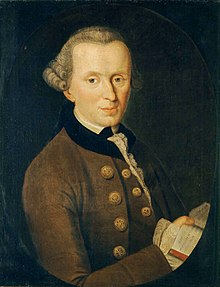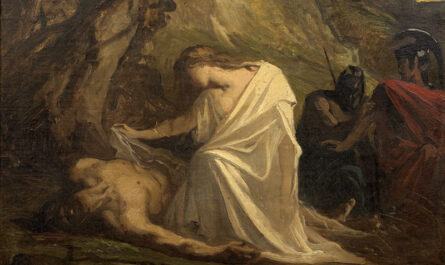Immanuel Kant is considered the great moral philosopher of the Enlightenment, or the Age of Reason, as he advocated for reason and human dignity, making it a central tenet of his theory. Kant was interested in determining the nature of reason and morality, and their implications for society. His greatest works, the three part Critique on Pure Reason, Critique on Practical Reason, and Critique on Theoretical Reason, illustrate the philosopher’s application of scientific inquiry to reason and morality.
Though Kant’s writing is as lofty and academic as it gets, he demonstrates the practical necessity for philosophy inquiry and critical thinking. Today, certain animal rights and climate change advocates would have us believe that human life is no more valuable or dignified than any other animal. While many people would refute this claim, most would not be able to outline a step by step analysis of how human reason differs from animal instinct; we simply take it to be “common sense.”

This represents a failing in the willingness and ability to think critically. How can we expect to defend our values and beliefs if we are unwilling to examine them? For this reason alone, the study of philosophy and critical thinking are valuable practices for everyone to familiarize themselves with. We are bombarded with messages on an hourly basis, often passively consuming information. We must be willing to examine this information, consider it critically, and reject what is not based on reason or in reality. This is why I consider philosophy to be of perennial importance; studying the writing of great thinkers gives an opportunity for thinking critically and sharpening our reason, with real world implications. Rigorous inquiry is like a workout for your mind; by tracing lines of thinking to their logical conclusions, and you exercise and improve your brain’s ability to make connections. While philosophical texts are sometimes regarded as playing with words and semantics, the resulting attitudes towards humanity, morality, and responsibility can be very dangerous or helpful. Kant’s writings have endured as some of the most helpful and humanity-affirming in history.
For this project, I chose the second Critique, as I felt Practical Reason would apply more easily to our purposes of taking wisdom from the ages, and applying it to our modern lives. It is also a quarter of the size of Pure Reason, (200 v 800 pages) which helped tremendously when setting out on this reading plan!
Happiness
Kant begins with the statement that
“To be happy is necessarily the wish of every finite rational being…”

This seems to hold true; this is conventional wisdom. Everyone works to make themselves happy, though “happy” means something different to every person, leading to what Kant calls the Fundamental Law of Pure Practical Reason,
“Act so that the maxim of your will can always at the same time hold good as a principle of universal legislation.”
Kant’s Practical Reason hinges on this wisdom. Make sure your decisions are made in such a way that they can be used as a general guideline for everyone. He goes on to address those instances where we act only out of desire to obtain some object; acceptance, a particular answer, etc. The difficulty being that they can not translate into any sort of more general guidance:
“All practical principles which presuppose an object (matter) of the faculty of desire as the ground of determination of the will are empirical and can furnish no practical laws.”
In other words, decisions made based on obtaining a goal are not decisions or reasoning that can be applied generally as any type of moral guidance. We know this; the action we take to make ourselves happy may not necessarily be the moral way to act nor will it necessarily make others in the same situation happy. As stated above, the importance of Kant’s writing here is that this had never been articulated before; all basis for human dignity was based on religious beliefs. Now the world had foundation of reason for these values.

Morality
Next, Kant addresses the question of how one could possible determine morality for all of humanity?
“What we call good must be an object of desire in the judgment of every rational man, and evil an object of aversion in the eyes of everyone; therefore in addition to sense, this judgment requires reason.”
Rather than focusing on what individual happiness in a given situation, the basis of morality must be more general and apply to everyone. Reason be definition applies to every rational being, therefore reason must be the basis of morality.
“Since in a morally goodwill the law itself must be the motive, the moral interest is a pure interest of practical reason alone, independent of sense.”
By sense, Kant is talking about desire. For someone to be morally good, the law (morality) itself must be the motivator. The moral law is based on practical reason, or general reason, alone, without regard for individual or situational desire.
Morality is produced by reason.
“The moral law breaks down self-conceit….Therefore respect for the moral law is a feeling which is produced by an intellectual cause, and this feeling is the only one that we know quite a priori and the necessity of which we can perceive.”
However, morality, while based in reason, also produces a “feeling conducive to the influence of the law on the will.”
In other words, acting morally also produces feelings of happiness and/ or satisfaction. So, the act of morality is based in reason, but overlaps with the subjective act of happiness.
“This feeling (which we call the moral feeling) is therefore produced simply by reason.”

Reason
Reason, therefore, is also the basis for regarding humankind as elevated above other animals:
“No doubt once this arrangement of nature has been made for him he requires reason in order to take into consideration his weal and woe, but besides this he possess it for a higher purpose also, namely, not only to take into consideration what is good or evil in itself, about which only pure reason, uninfluenced by any sensible interest, can judge, but also to distinguish this estimate thoroughly from the former and to make it the supreme condition thereof.” (emphasis mine)
What separates us from the animals, in part, is our ability to reason. We can separate choices made for our immediate pleasure from those which provide long-term benefits from those which are morally right in and of themselves. Employing reason in our decision-making is both an act of morality, according to Kant, and a display of our higher functioning, as psychology and neurobiology can attest.
Reasoning is the motivation behind morality, and exists in each of us naturally.

Duty
While morality provides the motivation for action, duty supplies the course of action. Kant defines duty as an “objectively practical action according to moral law.”
He goes on to say,
“Duty and obligation are the only two names that we must give to our relation to the moral law.”
“The majesty of duty has nothing to do with enjoyment of life; it has its special law and its special tribunal, and though the two should be never so well shaken together to be given well mixed, like medicine, to the sick soul, yet they will soon separate of themselves; and if they do not, the former will not act; and although physical life might gain somewhat in force, the moral life would fade away irrecoverably.”
Duty is not about happiness. Rather, reason demands we act in a certain way, or perform our duty. Kant’s metaphor is illuminating, showing how medicine (duty) can be mixed with happiness, but the two necessarily will separate. In order to maintain morality, we must act out of duty, not happiness. This also highlights our free-will and ability to choose our course of action.
“…the direct conception of the law and the objective necessity of obeying it as our duty, must be regarded as the proper springs of actions, since otherwise legality of actions might be produced, but not morality of character.”
Happiness, again
When we choose to act out our duty, the result is morality, joined by the feeling of happiness. Though it was not the chief motivation, it coincides with the feeling of satisfaction we get from acting in line with morality and duty, and brings the discussion full-circle.
From the beginning, Kant states that every rational being wants to be happy, but this alone cannot outline a moral law, as happiness means different things to different people in different situations.
He determines that “all happiness depends on moral conduct.”
What makes a person moral? Reason. Acting on that reason makes us moral, and being moral makes us happy. Therefore, happiness comes from moral conduct.

The Role of Morality and Philosophy
To that point, Kant concludes the text with a desire to change how morality and duty are portrayed toward children. Instead of celebrating the reward for noble actions, or advocating for a machine-like rigidity, void of humanity, the emphasis should be on the strict adherence to duty which, in turn, leads to noble acts:
“Only I wish they would spare them the example of so-called noble actions, in which our sentimental books so much abound, and would refer all to duty merely, and to the worth that a man can and must give himself in his own eyes by the consciousness of not having transgressed it…”
This does provide us with a dilemma, rather than focusing on the conquests of great men, should we not focus on the duty which compelled them? As we’ve seen you don’t create moral children by dazzling them with the glitz of victory and heroism; you do so by instilling a sense of duty and morality, and emphasizing the importance and satisfaction to be found in acting in line with them.
Philosophy is often regarded as boring or superfluous, however its undertaking is to determine the nature of knowledge and humanity; questions which translate into the very real political philosophies and policies which affect our daily lives. How we view people says everything about how well we serve our clients or customers, how we operate our businesses, and the sorts of policies we enact. Our relationship with and view of the truth also dictates our actions. Any discussion involving people, necessarily involves philosophy, formally or informally. It is my belief, that by studying the thoughts and writing of great thinkers of the past, we can greatly affect our futures in meaningful ways.
I’ll close with Kant’s accurate and beautiful summary of the role philosophy plays:
“Philosophy must always continue to be the guardian of this science [morality]; and although the public does not take any interest in its subtle investigations, it must take an interest in the resulting doctrines, which such an examination first puts in a clear light.”
Ed. note: This is the eleventh entry in a series looking at the three schools of philosophy for perspectives on relationships in our modern world. Inspired by Emerson’s “The American Scholar,” we are exploring timeless wisdom which endures to inform our approaches to learning, relationships and leadership. Click here for all the posts in this series.




